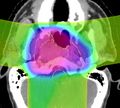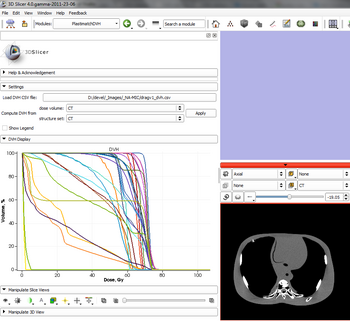Difference between revisions of "2011 Summer Project Week DVH"
From NAMIC Wiki
(Created page with '__NOTOC__ <gallery> Image:PW-MIT2011.png|Projects List Image:notfound.png|Interesting picture to be added... </gallery> ==Key Investigator…') |
|||
| (12 intermediate revisions by 2 users not shown) | |||
| Line 2: | Line 2: | ||
<gallery> | <gallery> | ||
Image:PW-MIT2011.png|[[2011_Summer_Project_Week#Projects|Projects List]] | Image:PW-MIT2011.png|[[2011_Summer_Project_Week#Projects|Projects List]] | ||
| − | Image: | + | Image:DBP3-MGH_ss_dose.png|Planned dose |
| + | Image:DBP3-MGH_dvh.png|Dose volume histogram | ||
</gallery> | </gallery> | ||
| Line 18: | Line 19: | ||
<h3>Objective</h3> | <h3>Objective</h3> | ||
| + | A dose volume histogram (DVH) is a tool used in radiation oncology to evaluate | ||
| + | and compare treatment plans for safety and efficacy. | ||
| + | Plastimatch currently has the capability to generate dose volume histograms, | ||
| + | however this capability is not available in Slicer. | ||
</div> | </div> | ||
| Line 25: | Line 30: | ||
<h3>Approach, Plan</h3> | <h3>Approach, Plan</h3> | ||
| − | + | In order to use the plastimatch DVH, it will be necessary to store the information | |
| − | + | about the structure names (available at time of structure load) for later | |
| + | retrieval. We will attempt to store this information in the ITK image | ||
| + | metadata. | ||
</div> | </div> | ||
| Line 34: | Line 41: | ||
<h3>Progress</h3> | <h3>Progress</h3> | ||
| + | Lots of success on this project! | ||
| + | |||
| + | * Created a new Slicer 4 loadable module, add to plastimatch project svn | ||
| + | |||
| + | * Create VTK chart widget with DVH data, display char in module GUI, draw DVH curves in chart | ||
| + | |||
| + | [[image:DVH_in_Slicer.png|Dose volume histogram in Slicer|350px]] | ||
| + | |||
| + | * The plugin can load a DVH from CSV-formatted file and display | ||
| + | * The plugin builds and links to plastimatch, and calls plastimatch DVH compute engine. However, this part does not yet work. | ||
</div> | </div> | ||
| Line 44: | Line 61: | ||
* [http://plastimatch.org/ Plastimatch] | * [http://plastimatch.org/ Plastimatch] | ||
| + | * [http://forge.abcd.harvard.edu/gf/project/plastimatch/scmsvn/?action=browse&path=%2Fplastimatch%2Ftrunk%2Fsrc%2Fslicer%2FPlastimatchDVH_Slicer4Plugin%2F DVH Chart source code] ([http://forge.abcd.harvard.edu/svn/plastimatch/plastimatch/trunk/src/slicer/PlastimatchDVH_Slicer4Plugin SVN] - user: anonymous, pwd: [empty]) | ||
==Delivery Mechanism== | ==Delivery Mechanism== | ||
| Line 49: | Line 67: | ||
This work will be delivered to the NAMIC Kit as a | This work will be delivered to the NAMIC Kit as a | ||
| − | #Slicer command line module | + | #Slicer command line module (Slicer 3) |
| + | #Slicer loadable module (Slicer 4) | ||
Latest revision as of 14:57, 24 June 2011
Home < 2011 Summer Project Week DVHKey Investigators
- MGH: Greg Sharp, Nadya Shusharina
- Isomics: Steve Pieper
- Queens: Csaba Pinter
- BWH: Tina Kapur
Dose Volume Histograms in Slicer
Objective
A dose volume histogram (DVH) is a tool used in radiation oncology to evaluate and compare treatment plans for safety and efficacy. Plastimatch currently has the capability to generate dose volume histograms, however this capability is not available in Slicer.
Approach, Plan
In order to use the plastimatch DVH, it will be necessary to store the information about the structure names (available at time of structure load) for later retrieval. We will attempt to store this information in the ITK image metadata.
Progress
Lots of success on this project!
- Created a new Slicer 4 loadable module, add to plastimatch project svn
- Create VTK chart widget with DVH data, display char in module GUI, draw DVH curves in chart
- The plugin can load a DVH from CSV-formatted file and display
- The plugin builds and links to plastimatch, and calls plastimatch DVH compute engine. However, this part does not yet work.
References
- Plastimatch
- DVH Chart source code (SVN - user: anonymous, pwd: [empty])
Delivery Mechanism
This work will be delivered to the NAMIC Kit as a
- Slicer command line module (Slicer 3)
- Slicer loadable module (Slicer 4)



